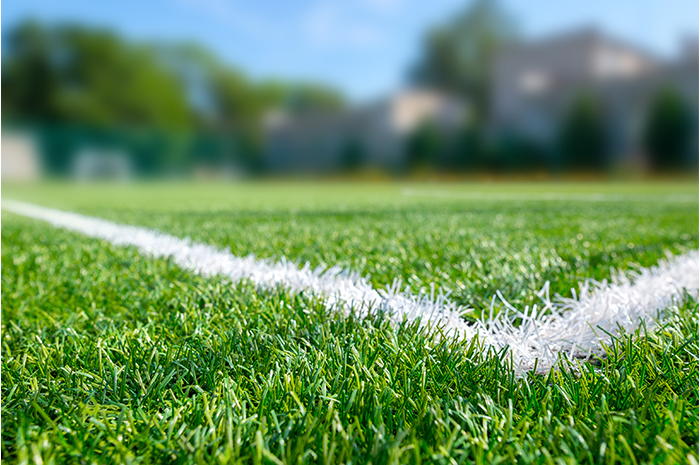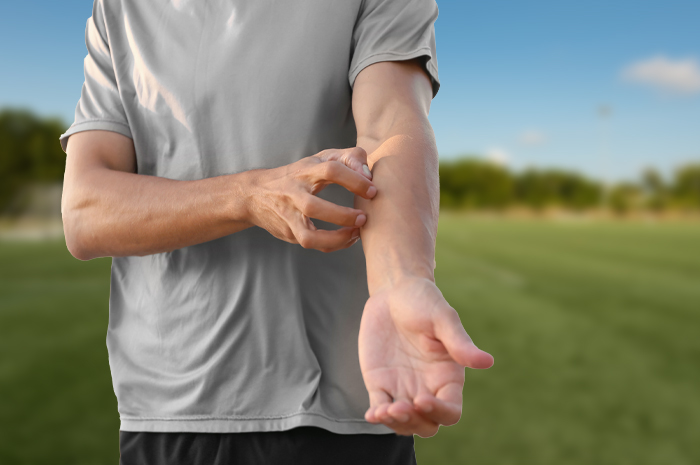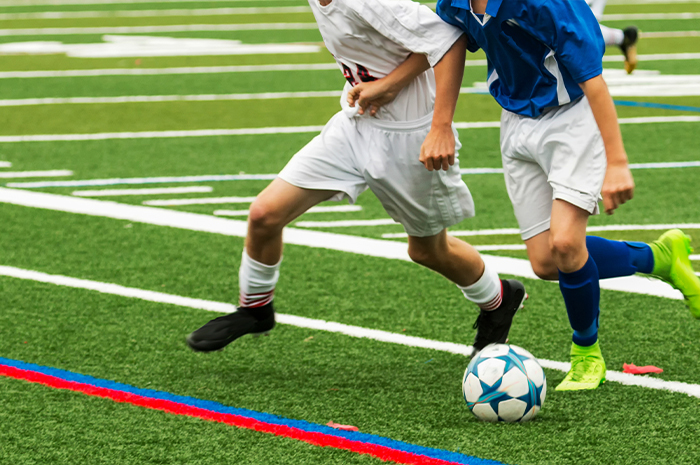Allergies in Sports: Artificial Turf Offers Clean, Pollen-Free Playing Surfaces
 Outdoor Allergies and Sports
Outdoor Allergies and Sports
Allergies are caused by the release of histamines when the body encounters allergens such as pollen from trees, weeds, and grass. Because athletes often play sports outside on large grass fields, they are exposed to allergens for long periods of time, often during exertion which can lead to heavier breathing and deeper inhalation. Shortness of breath and fatigue, among other respiratory issues, are common symptoms of allergies in sports and can make it difficult for athletes to stay at the top of their game.
And the culprit can often be grass.
Allergies From Grass Sports Fields
Allergies from grass are quite common. Up to 30% of Americans suffer from grass and weed allergens, which can cause sneezing, and runny eyes and noses. Grass allergies can trigger asthma too, inducing wheezing and shortness of breath.
 Fescue and Kentucky bluegrass are common grasses known to cause allergies; they also happen to be very popular grasses for sports fields. This means that many sports fields are exposing athletes to conditions that can cause negative reactions, like allergic rhinitis and hay fever. While not as common, for some, exposure to grass can lead to skin irritations, rashes, hives and dermatitis.
Fescue and Kentucky bluegrass are common grasses known to cause allergies; they also happen to be very popular grasses for sports fields. This means that many sports fields are exposing athletes to conditions that can cause negative reactions, like allergic rhinitis and hay fever. While not as common, for some, exposure to grass can lead to skin irritations, rashes, hives and dermatitis.
Playing on grass may mean athletes are playing on pollen-laden fields, potentially kicking it up from the playing surface throughout the game, breathing it in and exposing their skin to it. But not all health threats from grass sports fields are natural. Grass playing fields come with another concern: synthetic chemicals. In order to maintain playability, natural grass requires chemical applications like fertilizers, insecticides, herbicides, and pesticides. These can be toxic and hazardous to athletes, causing skin irritations or even triggering asthma attacks.
Exposure to chemicals and allergens while playing sports, either through breathing or coming into contact with the surface from falls or slides, can not only affect an athlete’s performance during the game but lead to uncomfortable health conditions even beyond the game, like rashes and continued respiratory symptoms.
But what can be done to reduce the limiting impacts that allergies in sports can have on athletes?
Allergen-free Play with Turf
Turf unlimits play in a lot of ways. It provides playing surfaces for urban and heavily populated areas that lack greenspace, drought-stricken regions, and areas that experience a lot of rain that can depreciate field quality. But it also offers allergen-free play.
Indoor stadiums, which often have turf, reduce exposure to air-borne allergens. But even outdoor turf fields have benefits. Unlike natural grass, they aren’t producing pollen underfoot, so they offer a relief from direct sources of potential allergens.

Turf fields do not require chemical applications to keep them pristine. They don’t release pollen. And there is no chance of unfriendly weeds or plants growing that can cause dermatitis or skin irritations from exposure. Turf offers a predictable playing surface that won’t come with allergic reactions.
Allergen-Free Outdoor Sports Fields
Short of cancelling games or having impacted athletes sit out when pollen counts are high, there isn’t much we can do to avoid outdoor allergens when playing sports outside. But because artificial turf offers allergen-free playing surfaces, it unlimits play for those that are sensitive to environmental allergens. When athletes aren’t battling allergens (on top of their opponents), they can feel and perform better.

